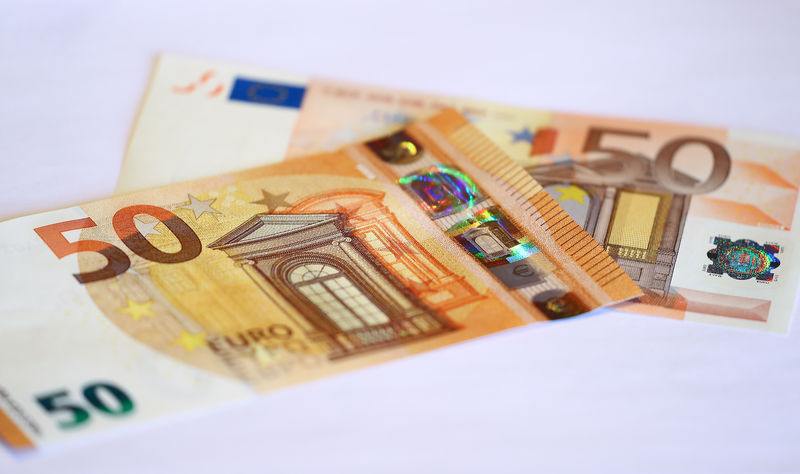By Tom Finn
LONDON (Reuters) - The euro fell nearly half a percent on Friday after signs that economic growth could be slowing across the euro zone.
Euro zone business growth slowed much faster than expected this month, a widely-watched Purchasing Managers Index (PMI) survey showed.
The disappointing readings were hastened by an ongoing U.S.-led trade war and will likely be of concern to the European Central Bank which is expected to draw a line under its 2.6 billion euro asset purchase program next month.
German private-sector growth slowed to its lowest level in nearly four years as factories in Europe's largest economy churned out goods at a slower pace.
The single currency, earlier trading positive, dropped more than 0.4 percent to as low as $1.1402 after the surveys were published. (EUR=EBS)
The euro also fell 0.2 percent against the Swiss franc to 1.1326 francs. (EURCHF=EBS)
"Particularly the German PMI was disappointing ... The environment for the euro is getting more difficult," said Thu Lan Nguyen, a Frankfurt-based strategist at Commerzbank (DE:CBKG), pointing to a dispute over Italy’s spending plans and concerns about the bloc's growth outlook.
"The economy in the euro zone has cooled significantly over the past months and unless this is just a brief interlude the European Central Bank might be forced to stick to an expansionary monetary policy," she said.
Weakness in the single currency supported the dollar, which rose 0.3 percent against a basket of currencies to trade flat at 96.706. (DXY)
The dollar has lost ground for two consecutive trading sessions and is drifting lower from a 16-month high of 97.69 hit earlier this month.
Dollar skeptics are concerned about the pace of future interest rate increases by the U.S. Federal Reserve.
Both the euro and sterling rose on Thursday after Britain and the European Commission agreed on a draft text outlining how their trading relationship will work once Britain has left the European Union.
But EU leaders still have to ratify the agreement at a summit on Sunday and Prime Minister Theresa May would then have to get a Brexit deal through a deeply divided British parliament.
At 0900 GMT the pound traded down 0.3 percent at $1.2838 after gaining 0.8 percent on Thursday. [EUR=EBS]
The Norwegian crown
The yen
The Australian dollar
Analysts expect the Aussie to remain subdued ahead of a meeting between U.S. and Chinese leaders at a G20 meeting in Argentina at the end of the month, with markets watching for any signs on whether they may agree to de-escalate their trade war.
(Graphic: World FX rates in 2018 http://tmsnrt.rs/2egbfVh)
